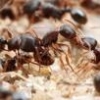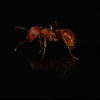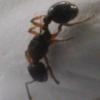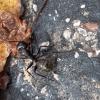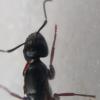- Formiculture.com
- Forums
- Gallery
- Members
- Member Map
- Chat
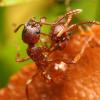
Pheidole low activity
Started By
iXvXi
, Feb 10 2016 2:26 PM
16 replies to this topic
#1
 Offline
-
Posted February 10 2016 - 2:26 PM
Offline
-
Posted February 10 2016 - 2:26 PM
I noticed my pheidole colony has started to be less active.
They have been really well fed recently. Is it possible they just don't need much resources right now?
Most seem to be huddled up in the nest with the queen.
Could humidity or temperature do this? I lowered their temp just a little because I was worried it might be too warm. (15 watt heat cable)
They have access to water in the outworld. I keep their nest a little on the dry side to prevent condensation.
Currently, their mostly on the ceiling in a chamber in the nest.
I can't see if I lost a lot of workers or not sense they're really small and hard to evaluate properly.
I also haven't see much brood at all, and haven't seen the queen in a while.
Thanks
They have been really well fed recently. Is it possible they just don't need much resources right now?
Most seem to be huddled up in the nest with the queen.
Could humidity or temperature do this? I lowered their temp just a little because I was worried it might be too warm. (15 watt heat cable)
They have access to water in the outworld. I keep their nest a little on the dry side to prevent condensation.
Currently, their mostly on the ceiling in a chamber in the nest.
I can't see if I lost a lot of workers or not sense they're really small and hard to evaluate properly.
I also haven't see much brood at all, and haven't seen the queen in a while.
Thanks
#2
 Offline
-
Posted February 10 2016 - 2:36 PM
Offline
-
Posted February 10 2016 - 2:36 PM
I noticed my pheidole colony has started to be less active.
They have been really well fed recently. Is it possible they just don't need much resources right now?
Most seem to be huddled up in the nest with the queen.
Could humidity or temperature do this? I lowered their temp just a little because I was worried it might be too warm. (15 watt heat cable)
They have access to water in the outworld. I keep their nest a little on the dry side to prevent condensation.
Currently, their mostly on the ceiling in a chamber in the nest.
I can't see if I lost a lot of workers or not sense they're really small and hard to evaluate properly.
I also haven't see much brood at all, and haven't seen the queen in a while.
Thanks
This sounds like they want hibernation. Did you hibernate them?
- iXvXi likes this
Currently Keeping:
Trachymyrmex septentrionalis
Pheidole pilifera
Forelius sp. (Monogynous, bicolored) "Midwestern Forelius"
Crematogaster cerasi
Pheidole bicarinata
Aphaenogaster rudis
Camponotus chromaiodes
Formica sp. (microgena species)
Nylanderia cf. arenivega
#3
 Offline
-
Posted February 10 2016 - 3:38 PM
Offline
-
Posted February 10 2016 - 3:38 PM
They have access to water in the outworld. I keep their nest a little on the dry side to prevent condensation.
Dehydration causes ants to act like they want to hibernate. They will cluster together in the nest and not move very much, just as in nature they would go deeper in the soil or nest where it is usually more moist.
- Barristan and iXvXi like this
byFormica® is the manufacturer of the iconic nectar feeders and Sunburst Ant Nectar.
byFormica ant products always deliver consistent performance, convenience,
and reliability, making them among the most beloved ant foods and kit enjoyed by
ant keeping enthusiasts worldwide. For more information, visit www.byFormica.com.
#4
 Offline
-
Posted February 10 2016 - 4:13 PM
Offline
-
Posted February 10 2016 - 4:13 PM
They don't need hibernation their first year I was told. They're only about 8 or 9 months old.
I'm thinking it might be due to dehydration. I put another liquid feeder of water in there just in case and will hydrate their nest more. I'll keep a close eye on them and report back with their progress once I can eliminate dehydration.
Thanks for both of your replies. I'd hate to learn the hard way on this colony; they were doing very well.
I'm thinking it might be due to dehydration. I put another liquid feeder of water in there just in case and will hydrate their nest more. I'll keep a close eye on them and report back with their progress once I can eliminate dehydration.
Thanks for both of your replies. I'd hate to learn the hard way on this colony; they were doing very well.
#5
 Offline
-
Posted February 10 2016 - 4:29 PM
Offline
-
Posted February 10 2016 - 4:29 PM
They don't need hibernation their first year I was told. They're only about 8 or 9 months old.
I'm thinking it might be due to dehydration. I put another liquid feeder of water in there just in case and will hydrate their nest more. I'll keep a close eye on them and report back with their progress once I can eliminate dehydration.
Thanks for both of your replies. I'd hate to learn the hard way on this colony; they were doing very well.
I don't understand how ants wouldn't need hibernation the first year but then the following years they would. The climate would generally be the same every year in their habitat. What do I know though? ![]()
- Jonathan21700 likes this
Currently Keeping:
Trachymyrmex septentrionalis
Pheidole pilifera
Forelius sp. (Monogynous, bicolored) "Midwestern Forelius"
Crematogaster cerasi
Pheidole bicarinata
Aphaenogaster rudis
Camponotus chromaiodes
Formica sp. (microgena species)
Nylanderia cf. arenivega
#6
 Offline
-
Posted February 10 2016 - 6:20 PM
Offline
-
Posted February 10 2016 - 6:20 PM
Maybe a more experienced member can chime in.
From what I understand, some temperate ants don't have to hibernate after their founding stage their first year, although it is healthy for them too. The second winter is almost a definite, due to the queen needing to rest for the coming spring.
I'm assuming it has to do with the age of the queen, because it's not a good idea to skip the hibernation the following year.
Although maybe me slightly lowering the temperature is making them think it's cooling down. I'll know for sure once I eliminate dehydration.
From what I understand, some temperate ants don't have to hibernate after their founding stage their first year, although it is healthy for them too. The second winter is almost a definite, due to the queen needing to rest for the coming spring.
I'm assuming it has to do with the age of the queen, because it's not a good idea to skip the hibernation the following year.
Although maybe me slightly lowering the temperature is making them think it's cooling down. I'll know for sure once I eliminate dehydration.
#7
 Offline
-
Posted February 11 2016 - 7:00 AM
Offline
-
Posted February 11 2016 - 7:00 AM
Nope, ants need hibernation every year it gets cold. Some queens won't even lay eggs until they are hibernated first. Hibernation is very important, even on the first year, if you are in an area where ants hibernate.
- Barristan and Jonathan21700 like this
#8
 Offline
-
Posted February 11 2016 - 1:35 PM
Offline
-
Posted February 11 2016 - 1:35 PM
Maybe a more experienced member can chime in.
From what I understand, some temperate ants don't have to hibernate after their founding stage their first year, although it is healthy for them too. The second winter is almost a definite, due to the queen needing to rest for the coming spring.
I'm assuming it has to do with the age of the queen, because it's not a good idea to skip the hibernation the following year.
Although maybe me slightly lowering the temperature is making them think it's cooling down. I'll know for sure once I eliminate dehydration.
I've kept quite a few colonies. I have just never come across a species that didn't need hibernation their first year.
Currently Keeping:
Trachymyrmex septentrionalis
Pheidole pilifera
Forelius sp. (Monogynous, bicolored) "Midwestern Forelius"
Crematogaster cerasi
Pheidole bicarinata
Aphaenogaster rudis
Camponotus chromaiodes
Formica sp. (microgena species)
Nylanderia cf. arenivega
#9
 Offline
-
Posted February 11 2016 - 3:02 PM
Offline
-
Posted February 11 2016 - 3:02 PM
Let me rephrase the word "need". Yes they "need" hibernation in the wild. Due to lack of food, temperature, humidity and access to water; this is their safeguard.
Not hibernating/ allowing your ants to enter a diapause/quiescence state or any form of dormancy by keeping the artificial summer like temperature and a constant 16:8 hr light cycle can have adverse negative effects in some cases.
The queen will likely have a slightly reduced lifespan. (7-8 year life span can be reduce upto almost half if NEVER "hibernated")
It also can reduce the rate the queen lays eggs and or possibly create issues the following spring with producing female sexuals in some cases. (Due to the colder temperatures the larvae need to properly develop)
From my understanding; I can get away with a 6 week period of only slightly reducing the temperature to 65-70 degrees ferohnheight. This allow's them to enter a periodic quiescence state, while still being able to develop brood. After the six weeks of reduced temperature, the queens egg production will start to bounce back.
Technically, it would still be considered "hibernation".
It's only being done the first year because of the affects it has on the queen.
*Please do not use anything written above to conclude any scientific facts. 😂
Not hibernating/ allowing your ants to enter a diapause/quiescence state or any form of dormancy by keeping the artificial summer like temperature and a constant 16:8 hr light cycle can have adverse negative effects in some cases.
The queen will likely have a slightly reduced lifespan. (7-8 year life span can be reduce upto almost half if NEVER "hibernated")
It also can reduce the rate the queen lays eggs and or possibly create issues the following spring with producing female sexuals in some cases. (Due to the colder temperatures the larvae need to properly develop)
From my understanding; I can get away with a 6 week period of only slightly reducing the temperature to 65-70 degrees ferohnheight. This allow's them to enter a periodic quiescence state, while still being able to develop brood. After the six weeks of reduced temperature, the queens egg production will start to bounce back.
Technically, it would still be considered "hibernation".
It's only being done the first year because of the affects it has on the queen.
*Please do not use anything written above to conclude any scientific facts. 😂
#10
 Offline
-
Posted February 11 2016 - 3:13 PM
Offline
-
Posted February 11 2016 - 3:13 PM
I also want to note that drtmiller's first assumption was right. Their nest must have been too dry although there was water in the outworld. They seemed to bounce right back! Thanks
- Barristan likes this
#11
 Offline
-
Posted February 12 2016 - 1:04 PM
Offline
-
Posted February 12 2016 - 1:04 PM
What species of Pheidole or were collected?
Edited by Jonathan21700, February 12 2016 - 1:05 PM.
#12
 Offline
-
Posted February 12 2016 - 4:55 PM
Offline
-
Posted February 12 2016 - 4:55 PM
What species of Pheidole or were collected?
Pheidole Bicarinata
#13
 Offline
-
Posted November 10 2021 - 7:42 PM
Offline
-
Posted November 10 2021 - 7:42 PM
Hi,
I have this small Pheidole megacephala colony I bought from Antsinnz. I have just seen that they are looking like they are dead, I saw they were active this morning, but then I looked this afternoon and they are all not moving. Are these signs of hibernation? The setup has been in the sun on my window sill, and it has been pretty warm lately. I don't know what to do and I'm really scared if they are dead. The queen hasn't layed any eggs lately and a few new generations of workers has arrived. She has also not been as active as she was when I bought the colony, she has been laying on her side a lot, and when I check up on the colony, she and the brood have moved. Also I accidentally tilted the nest to see if they would respond when they were bashed against the wall. ![]() I hope they are ok.
I hope they are ok. ![]()
Kool_Alate
Edited by Kool_Alate, November 10 2021 - 7:47 PM.
#14
 Offline
-
Posted November 10 2021 - 7:57 PM
Offline
-
Posted November 10 2021 - 7:57 PM
If the ants are in direct sunlight then you could have accidentally overheated them. If you can I would move them somewhere else, especially since they are on a heat cable too (In fact I would take them off the heat cable altogether since we're nearing hibernation time). Considering they are a small colony and you haven't seen the queen nor brood it's possible the queen died, but this wouldn't really explain why they are huddled in a corner. Another possibility is they are ready for hibernation and that the queen is somewhere in the middle of the ball of worker's.
- Manitobant likes this
My YouTube Channel.
My Ant Store: https://www.missouriantshop.com/
#15
 Offline
-
Posted November 11 2021 - 3:10 AM
Offline
-
Posted November 11 2021 - 3:10 AM
What is their setup like?
What temperature?
What and how often are you feeding them?
What temperature?
What and how often are you feeding them?
- TennesseeAnts likes this
"The ants are a people not strong, yet they prepare their meat in the summer." Prov. 30:25
Keep ordinary ants in extraordinary ways.
Keep ordinary ants in extraordinary ways.
#16
 Offline
-
Posted November 11 2021 - 12:02 PM
Offline
-
Posted November 11 2021 - 12:02 PM
Sadly, they have been in the direct sunlight of my window sill, and I have cooked them. ![]() This was my first ever colony, but I learnt the hard way. Farewell Mega Orange Empire, and Mega Maroon Empress.
This was my first ever colony, but I learnt the hard way. Farewell Mega Orange Empire, and Mega Maroon Empress. ![]()
- Antkeeper01 likes this
#17
 Offline
-
Posted November 11 2021 - 3:02 PM
Offline
-
Posted November 11 2021 - 3:02 PM
RIP we all make mistakes(especially me) and you can always get more next year or even now
1X Pogonomyrmex occidentalis 40-50 Workers
1X Solenopsis molesta 10 Workers (mono)
Ants I Want: Crematogaster sp, Camponotus Sp., Ponera Pennsylvanica, Mymercocystus sp.
My Youtube channel: https://www.youtube....kUjx-dPFMyVqOLw
Join Our Fledgling Discord Server https://discord.com/...089056687423489
1 user(s) are reading this topic
0 members, 1 guests, 0 anonymous users




